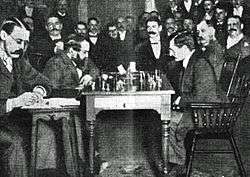World Chess Championship 1894
The fifth World Chess Championship was held in New York City (games 1-8), Philadelphia (games 9-11) and Montreal (games 12-19) between March 15 and May 26, 1894. Holder William Steinitz lost his title to challenger Emanuel Lasker, who was 32 years his junior.
Buildup
Reigning World Champion Steinitz publicly spoke of retiring, but changed his mind when Emanuel Lasker challenged him. Initially Lasker wanted to play for $5,000 a side and a match was agreed at stakes of $3,000 a side, but Steinitz agreed to a series of reductions when Lasker found it difficult to raise the money, and the final figure was $2,000 each, which was less than for some of Steinitz's earlier matches (the final combined stake of $4,000 would be worth about $495,500 at 2007 values[1]). Although this was publicly praised as an act of sportsmanship on Steinitz's part,[2] Steinitz may have desperately needed the money.[3]

Results
The first player to win ten games would be champion.
| 1 | 2 | 3 | 4 | 5 | 6 | 7 | 8 | 9 | 10 | 11 | 12 | 13 | 14 | 15 | 16 | 17 | 18 | 19 | Wins | Total | |
|---|---|---|---|---|---|---|---|---|---|---|---|---|---|---|---|---|---|---|---|---|---|
| |
1 | 0 | 1 | 0 | = | = | 1 | 1 | 1 | 1 | 1 | = | 0 | 0 | 1 | 1 | 0 | = | 1 | 10 | 12 |
| |
0 | 1 | 0 | 1 | = | = | 0 | 0 | 0 | 0 | 0 | = | 1 | 1 | 0 | 0 | 1 | = | 0 | 5 | 7 |
Lasker won the Championship.
Steinitz had previously declared he would win without doubt, so it came as a shock when Lasker won the first game. Steinitz responded by winning the second, and was able to maintain the balance until the sixth. However, Lasker won all the games from the seventh to the 11th. When the match resumed in Montreal, Steinitz looked in better shape and won the 13th and 14th games. Lasker struck back in the 15th and 16th, and Steinitz was unable to compensate for his losses in the middle of the match. Hence Lasker won with ten wins, five losses and four draws.[4][5] Some commentators thought Steinitz's habit of playing "experimental" moves in serious competition was a major factor in his downfall.[6]
| a | b | c | d | e | f | g | h | ||
| 8 |  | 8 | |||||||
| 7 | 7 | ||||||||
| 6 | 6 | ||||||||
| 5 | 5 | ||||||||
| 4 | 4 | ||||||||
| 3 | 3 | ||||||||
| 2 | 2 | ||||||||
| 1 | 1 | ||||||||
| a | b | c | d | e | f | g | h | ||
References
- ↑ Using incomes for the adjustment factor, as the outcome depended on a few months' hard work by the players; if prices are used for the conversion, the result is about $99,500 - see "Six Ways to Compute the Relative Value of a U.S. Dollar Amount, 1774 to Present". Retrieved 2008-11-19. However, Lasker later published an analysis showing that the winning player got $1,600 and the losing player $600 out of the $4,000, as the backers who had bet on the winner got the rest: Emanuel Lasker (January 1905). "From the Editorial Chair". Lasker's Chess Magazine. 1. Retrieved 2008-05-31.
- ↑ "Ready for a big chess match" (PDF). New York times. 11 March 1894. Retrieved 2008-11-19. Note this article implies that the final combined stake was US $4,500, but Lasker's financial analysis says it was $4,000: Emanuel Lasker (January 1905). "From the Editorial Chair". Lasker's Chess Magazine. 1. Retrieved 2008-05-31.
- ↑ "The Steinitz Papers - review". Retrieved 2008-11-19.
- ↑ Giffard, Nicolas (1993). Le Guide des Échecs (in French). Éditions Robert Laffont. p. 394.
- ↑ "Lasker v. Steinitz - World Championship Match 1894". Retrieved 2008-05-30.
- ↑ "William Steinitz dead". New York Times. August 14, 1900. Retrieved 2008-11-19. Also available in 2 parts at "Steinitz Obituary (Part 1 of 2)". Retrieved 2008-11-19. and "Steinitz Obituary (Part 2 of 2)". Retrieved 2008-11-19.
External links
- Source
- Preview in the New York Times, Mar 11 1894 (pdf file)